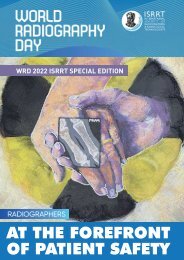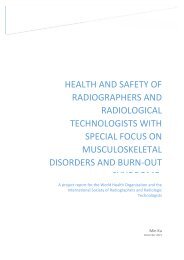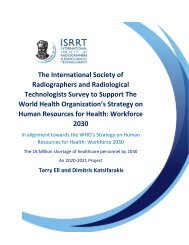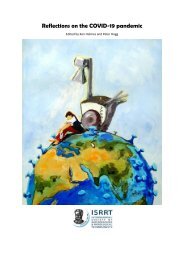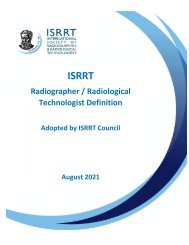2021_Book_TextbookOfPatientSafetyAndClin
You also want an ePaper? Increase the reach of your titles
YUMPU automatically turns print PDFs into web optimized ePapers that Google loves.
256<br />
direct effect of radiotherapy on depression as<br />
well as on several other symptoms.<br />
Patients often indicate fatigue as the most disturbing<br />
adverse effect of radiotherapy, more than<br />
pain, nausea, and vomit. Fatigue correlated with<br />
radiotherapy occurs acutely in 80% of patients<br />
and chronically in 30% of patients. For this reason,<br />
patients should be evaluated for this symptom<br />
at regular intervals.<br />
Dermatitis caused by radiation is a common<br />
adverse effect of radiotherapy, often complicating<br />
treatment of breast, prostate, perineum, and<br />
head and neck cancers. It is, however, difficult to<br />
evaluate the real burden of the phenomenon as<br />
clinical practice in this field is biased by unreliable<br />
and contradictory evidence. Early reactions<br />
include skin rash and dry and humid exfoliation,<br />
while delayed events include pigmentation<br />
changes, telangiectasias, hair loss, atrophy, and<br />
ulcerations.<br />
Concerning vascular diseases due to radiotherapy,<br />
a well-known adverse effect occurs<br />
mostly in Hodgkin lymphoma patients, and in<br />
lower numbers, in breast and lung cancer patients.<br />
It is estimated that the relative risk of cardiovascular<br />
events after mediastinal radiation ranges<br />
from 2.2% to 7.2% for Hodgkin lymphoma cases<br />
and from 1% to 2.2% for cancer of the left breast.<br />
Concerning lung effects, pneumonia due to<br />
radiation occurs in 5.15% of patients undergoing<br />
radiation for mediastinal cancers and breast and<br />
lung cancers. The risk is directly associated with<br />
the volume of the irradiated lung, intensity of<br />
radiation, and any concurrent chemotherapy.<br />
Toxicity of the digestive tract due to damage to<br />
the salivary glands is common in the radiation of<br />
the head and neck, especially in the case of concurrent<br />
chemotherapy. Esophagitis is also a common,<br />
early adverse effect whose frequency grows<br />
with the increasing of radioactive doses and in<br />
the presence of concurrent chemotherapy. Acute<br />
enteritis after radiotherapy is usually a selflimiting<br />
process by means of a correction to the<br />
diet and the administration of anti-diarrheal medications.<br />
Usually, the symptoms start 3 months<br />
after the end of radiotherapy and can last indefinitely.<br />
Another frequent symptom is the emesis<br />
induced by radiotherapy. The main risk factors<br />
include the completion of chemotherapy before<br />
radiation of the upper abdomen and the width of<br />
the irradiated areas. Patients who receive totalbody<br />
radiations are at higher risk. Acute bladder<br />
infection, including the most severe hemorrhagic<br />
cystitis, is a less common effect of radiotherapy,<br />
and the risk is augmented by concurrent<br />
chemotherapy.<br />
Sexual dysfunctions, including impotence, are<br />
common after radiotherapy for cancers of the<br />
prostate and, to a lesser extent, of the colonrectum.<br />
They are primarily a concern for older<br />
patients, who show a higher frequency of prostate<br />
cancer diagnosis. Erection dysfunction is more<br />
common with brachytherapy and with external<br />
radiotherapy. Among women, sexual dysfunctions<br />
are more common after radiotherapy for<br />
cervical and endometrial cancers. The adverse<br />
effects include a lower sex drive, vaginal dryness,<br />
and general sexual dissatisfaction.<br />
18.4 Medication Errors<br />
in Oncology Practice<br />
A. Marcolongo et al.<br />
The publication of the report “To err is human”<br />
by the Institute of Medicine of Washington<br />
(IOM) in 1999 has led to a radical change in<br />
healthcare organizations with regard to the<br />
understanding of the phenomenon of medical<br />
error. In oncology, the current definition of medication<br />
error, i.e., any “preventable event that<br />
may cause or lead to inappropriate medication<br />
use or patient harm while the medication is in<br />
the control of the healthcare professional,<br />
patient, or consumer,” is provided by the<br />
National Coordinating Council for Medical<br />
Error Reporting and Prevention.<br />
A recent review of the literature from 1980 to<br />
2017 has shown that medical errors in chemotherapy<br />
occur at a frequency ranging from 1 to 4<br />
cases per 1000 prescriptions, concerning at least<br />
1–3% of patients and appearing in all phases of<br />
the cure process [5]. The definition of medication<br />
error applies to all areas of medicine but can have<br />
different implications depending on the complexity<br />
of the discipline and the magnitude of the<br />
potential damage it can cause.











